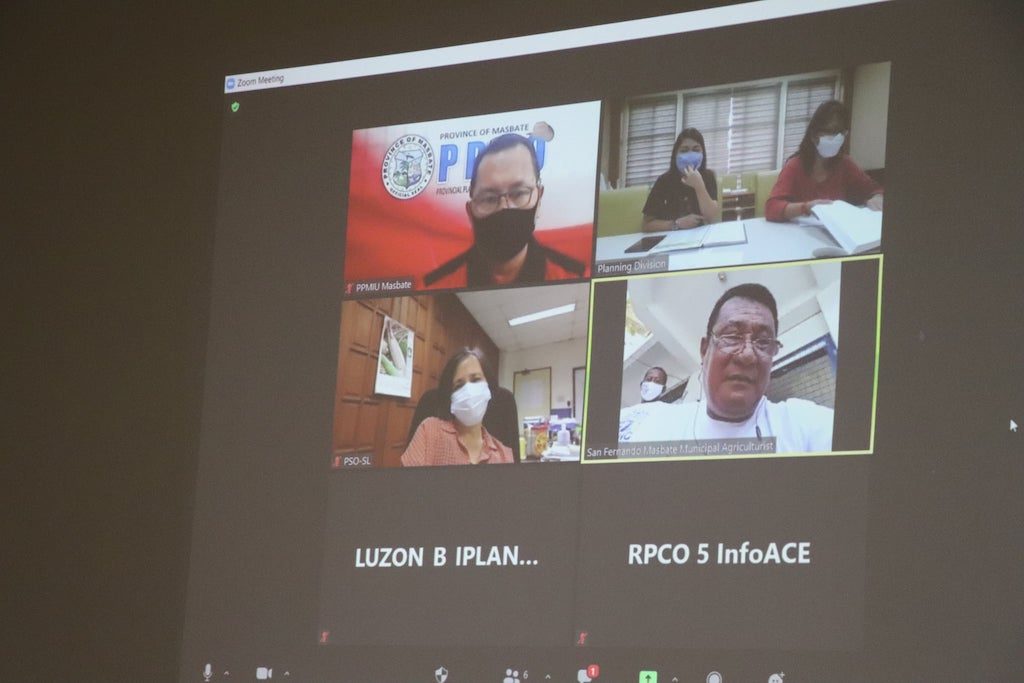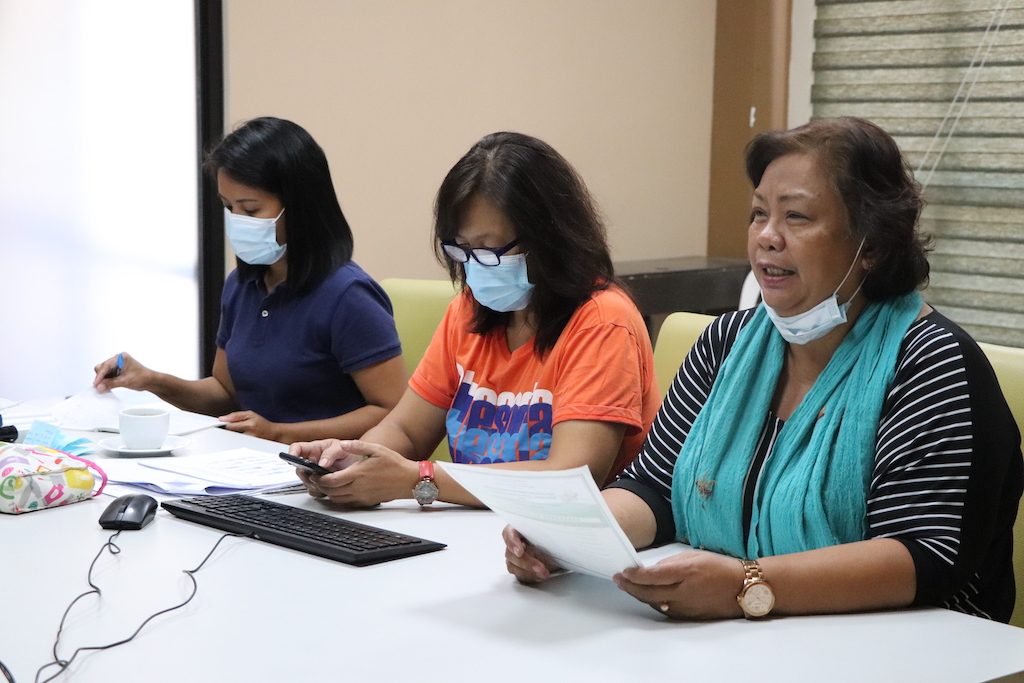 The Provincial Commodity Investment Plan (PCIP) Updating Workshop and Consultation With Stakeholders of San Fernando, Masbate was conducted virtually on October 28-29, 2020.
The Provincial Commodity Investment Plan (PCIP) Updating Workshop and Consultation With Stakeholders of San Fernando, Masbate was conducted virtually on October 28-29, 2020. Masbate to integrate ecosystem, biodiversity management in updated Commodity Investment Plan
Results of the 2016 Underwater Biophysical Assessment conducted by the Resources, Environment and Economics Center for Studies Inc. (REECS) show that live hard corals in San Fernando marine protected area (MPA) appeared to be in poor condition with a mean percentage cover of 22.0 percent while dead corals cover was high at 28.6 percent. This impacts both on subsistence and commercial fisheries in the area because fish and other marine organisms are dependent on these coral ecosystems as their spawning, breeding and feeding grounds.
According to Rosechell Labilles, Philippine Rural Development Project (PRDP) in Bicol Global Environment Facility (GEF) Unit Regional Natural Resource Management Officer, the slow coral cover development in the MPA site can be attributed to the stakeholders’ efforts which are more focused on natural restoration such as strict implementation of ordinance and deployment of Bantay-Dagat personnel.
“Wala pa tayong other strategy… plus madami pang ibang factors like every year may bagyo tayo which affects the marine environment,” she said. Labilles explained that typhoon and strong waves destroy seagrass and coral reefs.
The REECS findings also noted other threats to the coastal ecosystems including lack of appreciation and understanding of the ridge-to-reef concept, negative impact of tourism development, lack of residents’ participation in resource management and socio-economic threats such as low income during Southwest monsoon (habagat) and lack of alternative sources of income which often lead to fishing pressure and use of destructive fishing methods.
To integrate ecosystem and biodiversity management, climate resiliency and biodiversity conservation in Global Environment Facility (GEF) and non-GEF areas, the PRDP-Bicol Local and National Levels Planning (I-PLAN) component headed by Aloha Gigi I. Bañaria conducted the Provincial Commodity Investment Plan (PCIP) updating workshop and consultation with stakeholders of San Fernando, Masbate via teleconferencing on October 28-29, 2020. PRDP South Luzon I-PLAN Head Jo Marie Libarnes, Planning Specialist Alene M. Gregorio, PRDP-Bicol Deputy Project Director Adelina A. Losa, PRDP-Bicol Planning Specialist Mary Ann C. Cuya, Planning Officer Gladys S. Regondola, and Business Development Officer Glenn SM. Balana attended the virtual activity. They were joined by Provincial Project Management and Implementation Unit (PPMIU)-Masbate Head Engr. Ramon Marcaida Jr., PPMIU-Masbate I-PLAN Head Dr. Adonis C. Dilao, I-PLAN Staff Grace Graciana Tagnipez, San Fernando, Masbate Municipal Agriculturist Florizel M. Lim, over 20 stakeholders from LGU-San Fernando including the Municipal Fisheries and Aquatic Resources Management Council (MFARMC), and panelists from Bureau of Fisheries and Aquatic Resources (BFAR) Masbate and Office of the Provincial Agriculturist (OPAg) Fisheries Division.
Bañaria mentioned that the activity was also conducted in response to the 5th World Bank Review Mission Aide Memoire and as stipulated in the 6th and 10th WB Review Mission Aide Memoire which underscored the need to deepen and replicate ecosystem and biodiversity management in GEF and non-GEF areas as well as climate resiliency and biodiversity conservation aspects within the PCIPs.
The PCIP is a three-year rolling consensus plan between the Department of Agriculture and the Provincial Local Government Unit (PLGU) that serves as basis in selecting eligible interventions or sub-projects within the segments of the value chain for funding under PRDP.
“Alam po nating napakaimportanteng tool ang ating mga Provincial Commodity Investment Plans. Mas maraming interventions na makakatugon sa mga problema or constraints ng ating mga clients, mas masaya po tayo para matulungan po natin na mai-boost po ang economic productivity sa isang bayan sa Ticao Island, which is San Fernando, Masbate,” Bañaria said.
The PRDP and PPMIU planning team in consultation with stakeholders from San Fernando, Masbate identified biodiversity-based commodities for inclusion in the PCIP. These include seaweeds, blue crab, bangus, oyster and sea cucumber. They also proposed several interventions particularly livelihood options based on biodiversity commodities such as Establishment of Seaweed Nursery, Sea Cucumber Culture Production and Hatchery, Blue Crab Production and Processing and Oyster Culture Project to benefit the coastal areas in the province.
According to Labilles, having these livelihood options in the updated PCIP would significantly reduce fishing pressure which is one of the leading threats to the coastal ecosystem.
Marcaida, on the other hand, remarked that the PCIP Updating is timely for the Provincial Development Council (PDC) Meeting scheduled on October 30, 2020. He guaranteed that the presentation, approval and endorsement of the updated PCIP will be included in the PDC agenda.
The Donsol-Ticao-Burias Pass is included in the targeted sites listed in the National Biodiversity Strategy and Action Plan (NBSAP) cited as beneficiaries of the P287-million worth grant from GEF, one of the World Bank Group’s trust-funded programs for biodiversity conservation and strengthening of coastal and marine resource base under the PRDP. It covers MPAs in key marine biodiversity areas in San Fernando, Masbate and in the municipalities of Matnog, Bulan, Pilar and Magallanes in the province of Sorsogon by capacitating them in MPA and microenterprise subproject implementation. (Annielyn L. Baleza, DA-RAFIS V/PRDP RPCO V InfoACE Unit with reports from Rosechell Labilles, PRDP-GEF NRM)

The Provincial Commodity Investment Plan (PCIP) Updating Workshop and Consultation With Stakeholders of San Fernando, Masbate was conducted virtually on October 28-29, 2020.

